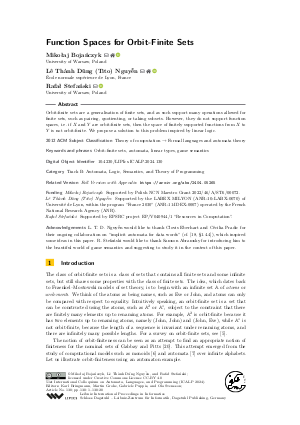LIPIcs.ICALP.2024.130.pdf
- Filesize: 0.93 MB
- 20 pages

 Creative Commons Attribution 4.0 International license
Creative Commons Attribution 4.0 International license

Orbit-finite sets are a generalisation of finite sets, and as such support many operations allowed for finite sets, such as pairing, quotienting, or taking subsets. However, they do not support function spaces, i.e. if X and Y are orbit-finite sets, then the space of finitely supported functions from X to Y is not orbit-finite. We propose a solution to this problem inspired by linear logic.

Feedback for Dagstuhl Publishing